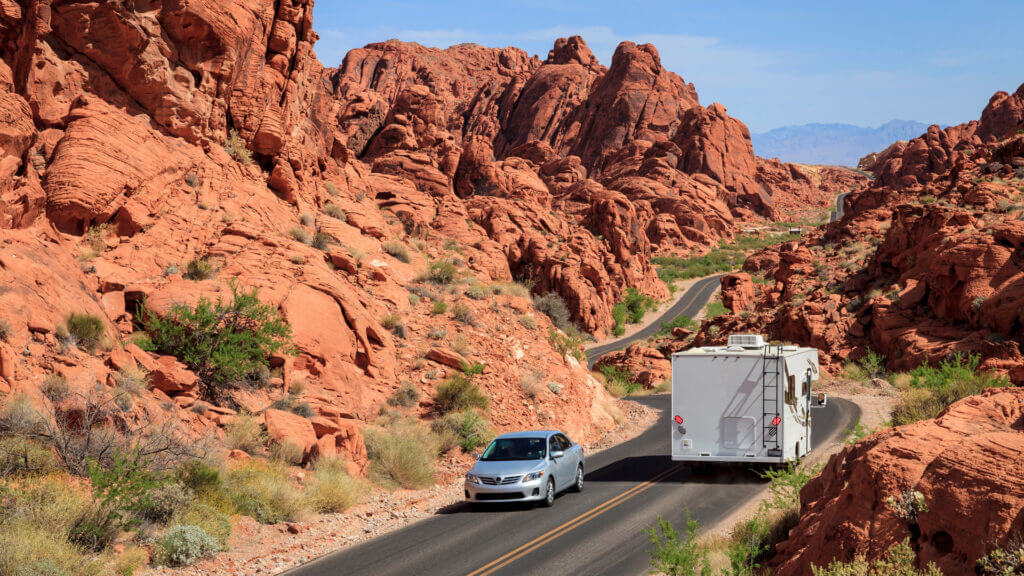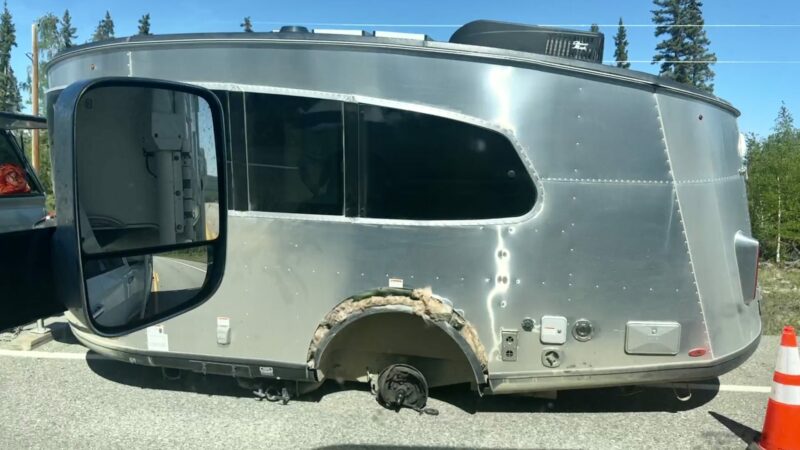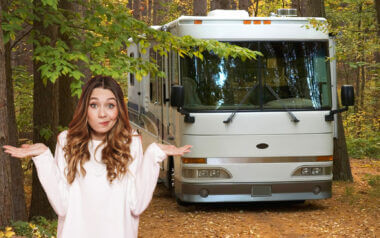Table of Contents Show
When on the road, we come across many people who are curious about RV life. Many ask, “Is RVing safe?” People expect a simple yes or no answer, but it’s a bit more complicated than just that.
Although, if we had to choose one quickly, the answer would immediately be, “Yes.”
Is RVing Safe?
Yes, RVing is safe. But remember, nothing in life is guaranteed, and that includes your safety in an RV. However, just as you would in a stationary life, RVing is quite safe if you take the proper precautions.
As long as you’re not taking a Class A down a Class IV rapid, that is!
Is RV Boondocking Safe?
Many assume you must stay in RV parks. And while this may be true for many RVers, there are many other options. More and more RVers are boondocking, meaning they’re staying on lands without hookups, and often, these lands can be pretty remote.
Is this type of RVing safe? Yes.
Boondocking is relatively safe if you’re prepared with water, fuel, maps, and everything your lifestyle needs. You’ll also need an action plan in an emergency that covers what to do if you feel threatened or what to do if your RV breaks down.
Thinking of this ahead of time and planning to resolve these issues will keep you safe and comfortable in the long run (even in remote areas).
RVing Safety Concerns
While there are many similarities between stationary home safety and RV safety, there are a few differences. Those differences can range from tire safety to driving and towing to where to camp.
RV Tire Safety
Since your home is now on wheels, ensuring those wheels are in good shape is vital. Knowing your tires and what they need from you will keep you, your precious passengers, and your cargo on the road where you need to be.
Inspect your tires before driving on them. Know their age. This is known as the DOT and can be found on the sidewall. If tires are older than five years, a professional should inspect them. In addition to that, watch for tread separation or sidewall cracking when checking your tires.
Know the tire pressure and speed rating needed for your specific tires. (The tire’s sidewall will also tell you this measurement.) Check it often. You might start at the right pressure; however, when traveling and changing climates, pressure can change, too.
Many RV tire stems are difficult to access, making it difficult to check the air. If so, have a professional check it for you. They will often do this free of charge.
Keeping your tires safe will reduce the risk of flat tires and blowouts. If your home is one on wheels, then those tires are a necessary piece of making sure that RVing is safe.
Pro Tip: Upgrading Your RV Tires? They’re Probably Inflated Wrong.
RV Fire Safety
RVs are not known for their fire-retardant materials. The National Fire Protection Association estimates that 20,000 RV fires occur annually. If a fire starts in an RV, it can spread quickly, resulting in detrimental damage and possibly death. Many fires begin while everyone is away. However, you can prevent most fire risks with simple precautionary tips.
Have fire extinguishers handy and know how to use them. Install carbon monoxide and smoke detectors and keep them maintained with batteries in working order. Have emergency fire exit plans just like you would at a stationary home. Have your propane lines checked and kept in proper working order to prevent leaks.
When away from your rig, unplug appliances, turn off exhaust fans, and don’t overload electrical outlets. Keep campfire sources away from the RV to avoid sparking a fire.
These are just a few tips for RV fire safety, but the best is merely knowing your RV. Eyeball it every time you park it and “feel” for problems when you start driving. If you catch something that’s off, don’t ignore it. You know your home on wheels; listen to what it’s telling you.
- Rechargeable REC5 Recreational Fire Extinguisher is UL rated 5-B: C and has a durable metal head, and is ideal for use...
- Designed to fight flammable-liquid and electrical fires; Uses sodium bicarbonate extinguishing agent
Driving and Towing Safety
Hopping into an RV isn’t the same as jumping into any simple car and taking off. While driving rules are the same, you should understand how your RV handles while on the road.
If you’re not confident In your RV driving skills, don’t be afraid to take a driving course. There’s nothing wrong with being extra cautious, keeping you, your passengers, and everyone else on the road safe. Also, be aware of safety while towing a vehicle or if your RV is the vehicle being towed.
A general rule of thumb when driving and towing is to keep your weight centered. RVs and trailers usually have effective placement of furnishings and cabinetry to balance the rig adequately.
However, loading up your camper can change that balance, so pack with that balance in mind. Don’t put all the heavy items in one area; leave your power tools at home. Secure larger items so they don’t inadvertently shift your weight while driving. Keep your rig’s center of gravity low to remain balanced.
There are many weight terms for driving and towing safety, but two of the more important to know are the GVWR and the GVW.
GVWR stands for gross vehicle weight rating. It’s the maximum weight rating from the chassis manufacturer. To clarify, the GVWR designates what the base frame of your rig can hold.
The GVW is the rig’s total weight when it’s fully loaded. This weight includes any passengers and any cargo, also including vehicle fluids. Remember, you need to know the GVW and GVWR for all vehicles, whether driving or towing them.
Head to your nearest truck stop or professional weigh station to check your weights and ensure you’re driving safely. Nobody wants to be overweight.
RV Park and Campground Safety
It’s not a given that RVing is safe in an RV park or campground. There are more people in these places than boondocking, and people can cause problems. Improper maintenance, theft, or even violence are all human-made problems.
Again, no one can guarantee safety; it doesn’t matter where you are. Pay attention to what you see when entering a campground or RV park. If there’s trash everywhere or the park is in general disarray, it’s normal to feel concerned. At the same time, you might be staying in an immaculate RV resort, and you could still experience theft, for example.
There are a couple of easy tips to help you increase your safety at RV parks, campgrounds, or anywhere else. One is to be aware of your surroundings at all times. Become familiar with the buildings, landscape, and neighbors when possible. Be confident. Smile at people and let them know you see them.
Another easy tip is to lock your doors and valuables while away, just like at home. Take away those crimes of convenience, and a crime might not happen. If a door is easy to open, it’s easy for someone to pop in, take a few things, and leave unnoticed. If locked, it takes more time, and a thief is more likely to abandon their plight for fear of being seen.
Utilizing those simple steps and an emergency action plan you know well will help minimize many safety concerns while staying in an RV park or campground.
Boondocking Safety
Many people wonder if boondocking is safe. It is if you follow the same safety measures as you would in an RV park and campground, and then some. An emergency action plan is one of the most critical safety plans when boondocking.
An emergency action plan needs to fit your style of living and camping. If your plan includes weapons, know state laws when visiting. And set evacuation plans in place.
Learn how your insurance policy works and what’s covered. While those are all necessary for any type of camping, they become more critical if coming across an issue when in a remote area.
Also, know your style, what you’re comfortable with, or what you’re willing to try. For example, if you’ve never camped off the grid before and know nothing about finding boondocking sites, take it one step at a time. Go out with friends who can give you a helping hand and show you the ropes.
If you’ve been backcountry camping or hiking before your RV experience, this knowledge easily transitions into boondocking safely. Knowing routes in and out, understanding water conservation, and trusting your gut can keep you safe while camping in the most remote places. Almost as if you were on your own two feet in the middle of the wilderness.
Staying Safe In New and Unfamiliar Areas
All of the above safety tips will help keep you safe in new and unfamiliar areas, but we’ll cover a few more essential tips when visiting new places.
For starters, daylight should be your best friend. New areas are much easier to explore and get around at night if you’ve already had a chance to explore during the day. Do your best to arrive at a new place with enough daylight to access your spot, set up, and get to know the terrain before nightfall.
Don’t merely rely on your cell phone. You might not have a signal. Take the time to greet people, especially park rangers. They’ll become your other best friends when exploring unknown places. Use apps on your phone, but bring maps as backups. Paper maps don’t need reliable cell signals. And trust your gut!
When In Doubt, Leave
If anything feels off, even if it’s just a weird feeling, listen to it. If you can do so safely, leave. Find another spot. There’s no campsite worth losing your life over. That may sound drastic, and most times, you don’t have to worry about that. However, if your instincts are telling you to leave, then leave. If nothing else, it’ll give you peace of mind.
On the other hand, don’t let trash and disarray immediately turn you off. Some places are where you’ll meet the kindest and most interesting people. Trusting your gut is different than judging. Learn to recognize the difference and be confident.

RVing Is Safe, but Safety Is Never Guaranteed
RVing can be safe. But, ultimately, that safety is up to you and how you RV. If you’re the adventurous type and have an RV built for off-roading, your chance at safety might decrease a bit compared to an RVer who drives 55 and parks at RV resorts.
Then again, it all comes back to the fact that no one can guarantee safety. Do your part, learn your RV style, and live your life—it’s the only one you’ve got.
Last update on 2025-01-19 / Affiliate links / Images from Amazon Product Advertising API







